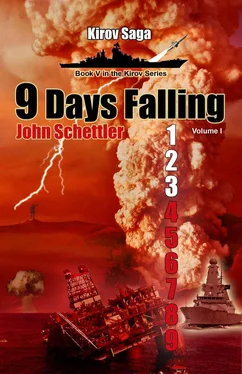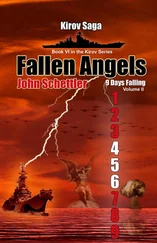“Mironov? You mean the man Zykov brought in?” Troyak was surprised to hear this.
“Exactly! But Troyak! That place—the inn—it was the same in many ways, yet different. I mean, it was clear to me that this was the inn at Ilanskiy, but the village outside was much smaller. There were no buildings at all between the inn and the rail lines. And the train…yes! The train was gone too!”
Troyak gave him a strange look now, a flicker of disbelief in his eyes. “We couldn’t find you, Colonel, not even using the comm-link locators in your jacket. Zykov and I searched the whole building—outside too. Zykov went all the way to the rail yard, but the train was there. We’re sitting on it, Fedorov.”
“I know…I know…but what I’m saying is true.”
Fedorov shook his head. “This is going to sound very odd now, Troyak, but you must believe me. It happened just as I’m about to tell you. This whole place, the town, the rail yard, the inn, was completely different. And another thing—it was morning! At first I thought it was that massive explosion we heard, but then I could clearly see the morning sun, though it was rising through a terrible orange fire in the sky to the northeast.
“But Fedorov…We saw none of this! It was an hour before midnight when we were awakened.”
“Yes I believe you, Sergeant, but you must believe me as well. I spoke with that man—Mironov—and he even invited me to join his party for breakfast. He handed me…” Fedorov reached into this coat pocket, a look of excitement in his eyes. “Yes!” He pulled out a piece of dark rye bread, his hand shaking a bit. “He handed me this piece of bread when he made the invitation! Then three men came in—Germans, Troyak, so you can understand I was very surprised and confused by all this.”
“Germans? Here?”
“I swear it.” Fedorov shook his head. “All I could think to do was get the hell back up those stairs and then I saw you in the upper hall.”
“Did the Germans get this far during the war? I thought we stopped them on the Volga.”
“No, no. You misunderstand me. What you say is correct. We did stop them on the Volga, but these men we not soldiers…and it wasn’t 1942.”
Now Troyak cocked his head to one side, eyes narrowing. What was the Colonel talking about?
“Bear with me,” Fedorov continued.
“Alright, but it’s almost midnight , Fedorov. You were gone for an hour. We searched the whole area. Now you’re telling me you were just downstairs? And this explosion you speak of. Yes, I heard it too when I was searching the top floor of the inn. And yes, it seemed to me that it was coming from that stairwell, so I went down to have a look.”
“You went down the back stairs too?”
“Yes, and all I found was that woman by the fire. Nothing else, Colonel.”
This gave Fedorov pause, his eyes dark and searching, as if he was trying to determine something and solve the riddle. “So it doesn’t always work,” he said, more to himself than to Troyak. “Listen…The Man Zykov brought in… He called himself Mironov, but do you remember what I asked him? I asked him what year it was. And did you hear what he said? He said it was 1908! Well, when I was near the front desk and those Germans came in I saw a calendar there, and sure enough, it was set to June 1908. That doesn’t necessarily prove anything, and that’s why I asked that man the day and year. Yet he said it was the thirtieth of June, 1908, and without the slightest hesitation. This sounds crazy, but it happened, Troyak. You heard him yourself.”
“Yes, I heard him say that, but a man might say anything when he is frightened. It seemed like he thought we were police.”
“Yet why give such an outlandish date?”
The Sergeant folded his arms over his broad chest, breathing deeply. “It’s been a long trip, Colonel. You slept a very long time. Perhaps this was all just a dream?”
“Not this, Troyak. No, I’m certain of it. It sounds impossible, but when I went down those stairs I was… somewhere else . It was too real to be a dream. I mean, I was here, but in another year. That’s the only way I can understand it now. That would sound completely insane were it not for the experiences we’ve both lived through these last months. The impossible has become commonplace for us. But I just can’t figure out what happened exactly—or how it happened. It must be a localized event, possibly even an aftereffect of the big event. It must be confined to that one small space—the stairway.” Again he seemed to be speaking more to himself now, sorting through something in his mind.
“What do you mean?”
When I went down, I regressed in time , Troyak! Yes, to the year 1908! That explains why everything was different, even the time of day. I could dismiss it all as a delusion or dream until Zykov brought that fellow in—Mironov! That was the man I spoke with in the dining hall; the man who gave me this bread. And look, it’s still fresh!”
“But how, Fedorov? I don’t understand any of this. You tried to explain how the ship moved before, but even that was beyond me—all this business about the reactors and Rod-25.”
“I can’t say I understand it all yet either, but it happened. I swear it. Zykov brought Mironov in and I was truly shaken, because the moment I saw him I knew everything that I experienced at the other end of those stairs was real and not a dream. Understand? So I asked him the date, and you heard what he said.”
Troyak sighed, nodding.
“Well that is a very special date, Sergeant. June 30th, 1908. Do you know what happened on that day?” Fedorov smiled now, his eyes alight with the vigor of his inner thoughts. “The explosion, the rumbling sounds, the glow we saw—I confirmed that it was some massive detonation to the northeast. Well, on the morning of June 30, 1908, about 600 kilometers northeast of Ilanskiy, something exploded above the taiga near Vanavara, along the river they call the Stony Tunguska.”
“Tunguska?”
“Yes, you’ve heard of it. We all have. It’s been a great unexplained mystery for decades. Some say it was an asteroid, others a comet, still others say it was caused by some kind of miniature black hole but, whatever it was, it happened on that date—the same date Mironov reported. It was the morning of the Tunguska event, Troyak, and I saw it, plain as a second sunrise in the northeast. I saw it with my own eyes!”
Troyak remained silent. He did not know what to make of all this, but then again one thing Fedorov said struck home. The impossible was made commonplace for the men of Kirov . He had watched, dumbfounded, as the ship fought its way through the North Atlantic and Mediterranean, amazed at what he was seeing, but stalwart nonetheless. Seeing was believing. He saw the Japanese planes from the Second World War dive bombing the ship, and he himself had vanished from the world he once knew to appear here, on a train to Omsk in the middle of 1942! Things that he once deemed fantasy had become grippingly real. He was now a believer. He had heard the siren song of time like the others and it was trying to drive him mad.
He steadied himself, deciding to give Fedorov the benefit of any doubt. He had gone down those stairs himself, and saw nothing—except the same strange illusion they were still riding in at this very moment, the Trans-Siberian rail line in Stalin’s Russia. What Fedorov was saying is that time slipped again. He went down those stairs and saw something. At least he could believe that much. What reason would the Colonel have to make up a story like this? He had no haversack to put this into, no drill or military routine to set in motion. This was just another here and now, and the old instincts that had served him for so many years in the Marines would just have to do.
Читать дальше












